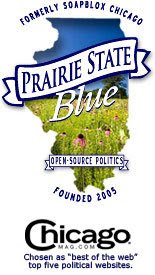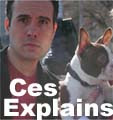What’s surprising about Suskind’s summary of Bush’s “walk,” to borrow an evangelical term, is how small a role Jesus Christ seems to play in it. God gets a few cameos, but even he’s a supporting player. Front and center, though, is faith.I really don't like how this analysis seems to explain so much of the Bush administration's inexplicable behavior.
***
Believing, it seems, is more important to the President than the substance of his belief. Jesus Christ’s particular teachings -- well, those are good, too. But what really matters is that if you believe you can do something, you can.
What Suskind misses, and what Bush’s more orthodox Christian supporters seem to dodge, is that this is not Christian doctrine by any definition. It is, in fact, a key element of the broad, heterodox movement known as New Age religion.
A common aspect of many New Age schools of thought (though not all; plenty of them blend numerous philosophical traditions in a sophisticated manner) is a gentle disdain for perceived reality. Many New Agers argue that their beliefs are actually ancient; and, despite the fact that the superficial characteristics are often of a recent vintage, there’s some truth to that assertion. New Age religions are, literally, reactionary, responses to what’s been called the disenchantment of the world. Another word for that process is the Enlightenment, with its claims of empirical accuracy.
***
Bush does seem to be a descendent of the Enlightenment: He’s Rousseau’s noble savage, operating on the pure, animal instincts that’re true because they are, and are because they’re true. The noble savage does not live in what Bush’s aide contemptuously calls “the reality-based community”; he is in and is of a “nature” more real than reality, which, in an unexpected nod to postmodernism, Bush believers seem to dismiss as a social construct.
***
Much has been said about his subtle use of scriptural citations as "coded" signals to his base. But every account of his worldview suggests that he sees no need to be sneaky. He is not sending secret messages. When he speaks of "wonderworking power" (a reference to the gospel standard "Power in the Blood"), as he did in his now infamous "mission accomplished" speech, he is drawing that power into being, to make his desires into reality. Politics, strategy, books, the Bible -- everything falls away in the realm of magical realism.
***
I happen to like the idea that faith is a path away from easy certainty, but I know it’s just that -- an idea. *** It's not an idea shared by many New Age religions. Such beliefs emphasize that certainty is easy, if you'll just give up the illusion of reality, since certainty is as close to you as your own heart. One need not investigate with the tools of rationalism, but rather, simply -- the simplicity of it all is key -- feel.
Bush feels. The press, so far, does not. In grappling with Bush’s presidency, it has expanded its range, developed a more nuanced understanding of traditional Christian fundamentalism, recognized liberal evangelicalism, and acknowledged the limitations of Enlightenment thinking. But it still can’t account for the kind of magic that says, If you believe you can do something -- become president despite losing the popular vote, launch a war without evidence, and maybe, if you REALLY believe, get re-elected anyway -- you can.
Sunday, October 17, 2004
Magical Thinking II
Jeff Sharlet, co-author of Killing the Buddha and editor of The Revealer, asks: "Is George W. Bush the first magical president of the United States?"
Subscribe to:
Post Comments (Atom)
Followers
Blog Archive
-
▼
2004
(398)
-
▼
October
(89)
- NONE DARE CALL IT "QUAGMIRE"
- Statement From 'Jersey Girls' on Bin Laden Video
- PUTTING THE "ASS" IN AMBASSADOR
- WANTED: DEAD OR ALIVE
- GET FIRED UP!
- ONE PEOPLE, ONE COUNTRY, ONE LEADER...
- SEVEN DAYS O' WEAK
- KEYES CAMPAIGN NEWSLETTER
- SPRINGSTEEN APPEARANCE AT KERRY RALLY SWAYS UNDECIDED
- A COMMANDER IS RESPONSIBLE FOR EVERYTHING HIS TROO...
- DuPAGE DEMOCRATS GET OUT THE VOTE RALLY
- WHAT IS POSTMODERNISM?
- GET YOUR WAR ON #42
- "With all deliberate speed."
- CEGELIS FILES COMPLAINT WITH BOARD OF ELECTIONS
- 2,584 - 8,613 OKLAHOMA CITY-SIZED BOMBS
- MeinBlog.blogspot.com
- REHNQUIST HOSPITALIZED WITH CANCER
- Jon Stewart on C-SPAN
- SENATE DEBATE 2... AS VIEWED ON BIZZARO-WORLD
- "If her husband is one-fourth as good as she is, h...
- A DAMNING COMPARISON
- OCTOBER SURPRISE RESCHEDULED FOR NOVEMBER? PT 2
- OCTOBER SURPRISE RESCHEDULED FOR NOVEMBER?
- CEGELIS BATTLING BALLOT ERROR
- DELUSIONAL VOTERS SUPPORT DELUSIONAL PRESIDENT
- WHOOPSIE!
- OBAMA DISCUSSES SUPREME COURT NOMINEES
- CAN WE EXPECT FIREWORKS AT TOMORROW'S SENATE DEBATE?
- "I thought that this would be a fair election, I w...
- Clinton to stump for Kerry
- FLU AS SYMPTOM OF BUSH INEFFECTIVENESS
- KERRY BASHER PUNKS VATICAN
- Bush told Robertson: 'We're not going to have any ...
- High Noon at Sun-Times
- OBAMA MAY SWING SENATE
- 1st AMENDMENT IN PUTIN-IZED AMERICA
- ATTENTION UNDECIDED VOTERS: HIGH TIMES ENDORSES KERRY
- Robert Novak Compares George W. Bush to Adolf Hitler
- BushKilledSuperman.com
- .06% Agree with Keyes
- Alan Keyes presents: Circular Reasoning
- Keyes for Senate E-Mail
- Nader's running mate to vote for Kerry
- Magical Thinking II
- Magical Thinking
- Magical Thinking III
- A new day dawns in Chicago suburbs
- "Working together, the ants eat the elephant"
- Wes Clark battles for Melissa Bean
- Paging Dr. Freud. Paging Dr. Freud.
- Worst Obama story ever?
- Leader: Keyes has made millions in Illinois
- "An officer is responsible for everything his troo...
- Support the Troops
- South Dakota garbage shipped to Ohio
- Was I listening to the wrong station?
- Kerry-Obama Symbiosis
- Is that a "Talking Point" in your pocket or are yo...
- Dirty South Dakota GOP
- The Keyes Choice: GOP or God
- Obama on Bush
- Morning Edition Looks at Obama's Sentate Race
- "We don't give a crap. What are they going to do, ...
- In defense of an Ivy League education
- Blago's subconscious to Blago: You need to be more...
- Obama's Springfield Record Examined
- It seems like something significant happens in Iow...
- Your friends and neighbors
- What are they teaching in catechism class these days?
- Cheney: There are way more dead people than that i...
- Barack Obama, Alan Keyes Face Off On City Desk
- I guess it depends on your definition of "met."
- Mark Your Calendar
- The Obama-Keyes Gap May Close
- "It's not your typical neighborly, folksy Midweste...
- Keyes' Website: Keyes Won't Win
- Don't forget about Poland!
- Debating Points
- W: Pride of the Bush Family
- George W. Bush: Standing Tall
- Bush v. Troops
- Jesus wouldn't play Scrabble against Obama
- New York Times looks at the possibility of a frigg...
- Alan Keyes presents Fortress America
- The bounce you heard was Georgie's head on the mat.
- "I didn't do it, nobody saw me do it, there's no w...
- Keyes in Metropolis
- "I'm trying to put a leash on them."
-
▼
October
(89)













No comments:
Post a Comment